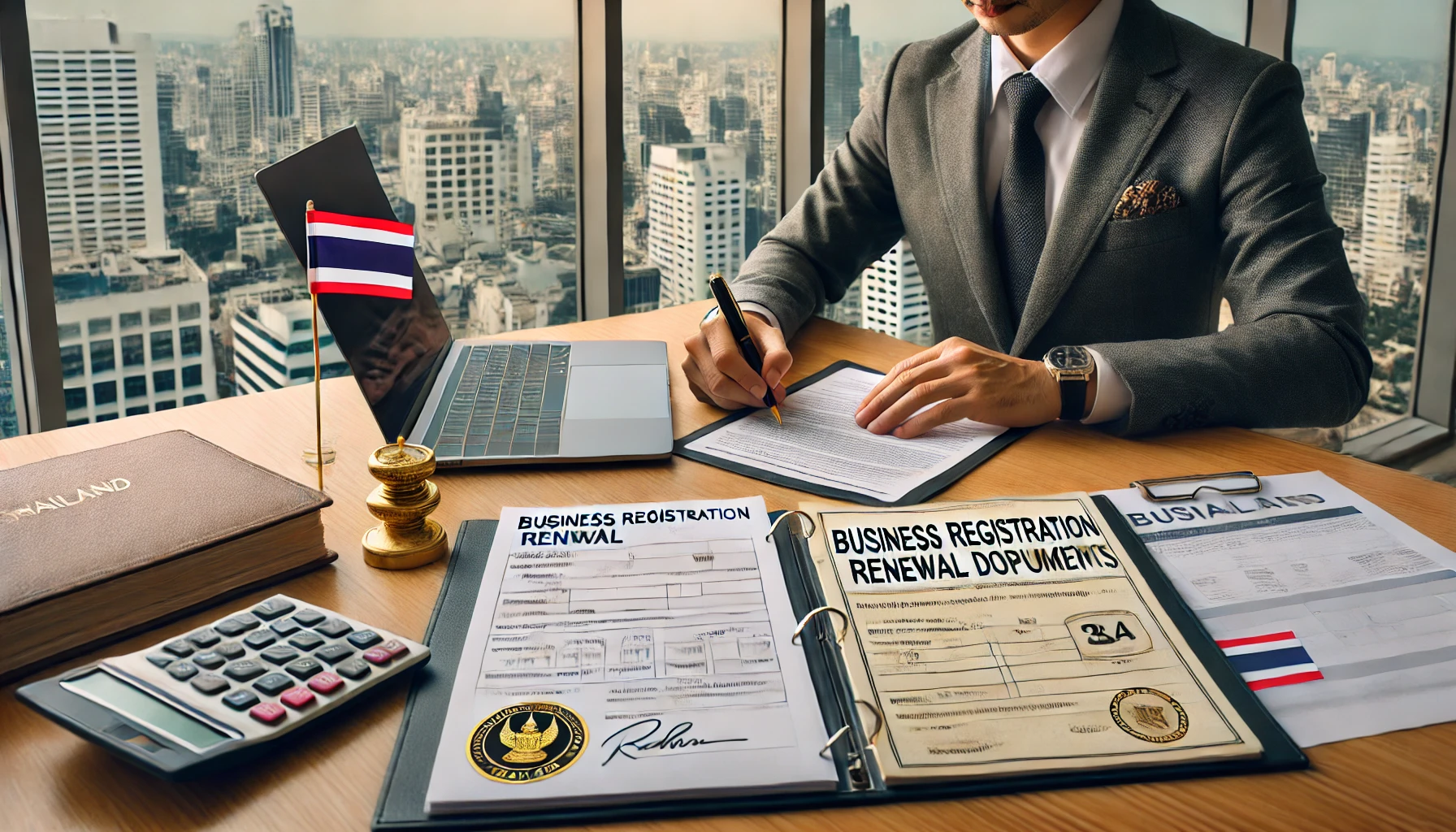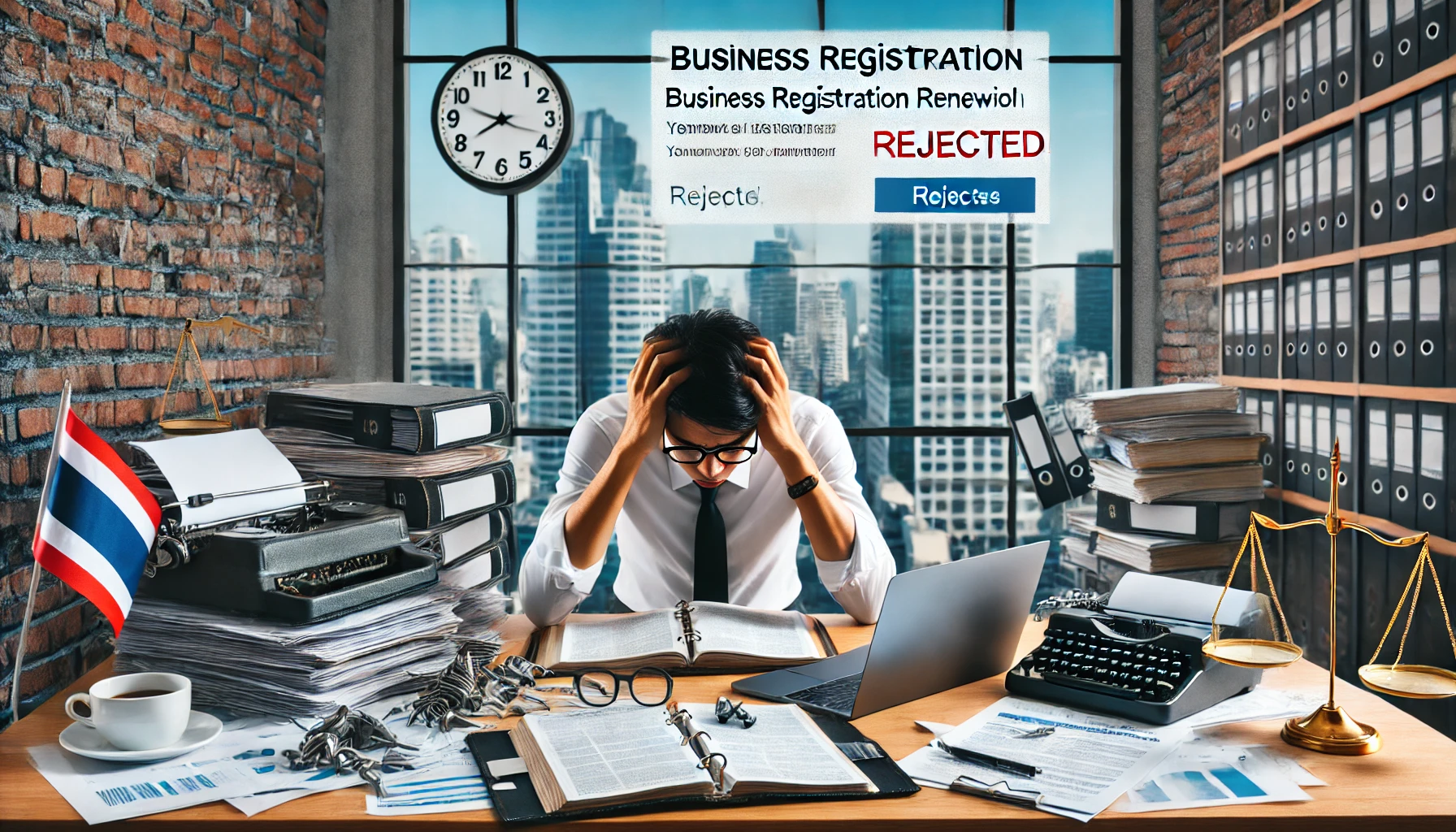Is your Thai business registration due for renewal? Don’t let the complexities of Thai bureaucracy catch you off guard! 🇹🇭📊
Navigating the renewal process can be a daunting task, especially for foreign business owners. From understanding the legal requirements to gathering the necessary documents, the journey can be fraught with challenges. But fear not! We’re here to guide you through the maze of Thai business registration renewal, ensuring your company stays compliant and continues to thrive in the Land of Smiles.
In this comprehensive guide, we’ll walk you through the essential steps of renewing your business registration in Thailand. We’ll explore common pitfalls to avoid, highlight the benefits of timely renewal, and even discuss how professional services can streamline the process for you. Whether you’re a seasoned entrepreneur or a newcomer to the Thai business scene, this post will equip you with the knowledge you need to keep your business running smoothly and legally. Let’s dive in and demystify the world of Thai business registration renewal!
Understanding Business Registration Renewal in Thailand

Key deadlines for renewal
Staying on top of renewal deadlines is crucial for maintaining your business registration in Thailand. Here are the key deadlines to remember:
- Annual financial statement submission: Within 5 months after the fiscal year-end
- Corporate income tax return filing: Within 150 days after the fiscal year-end
- Business registration renewal: Annually, within 30 days of the company’s registration anniversary
| Deadline Type | Timeframe |
|---|---|
| Financial Statement | 5 months post-fiscal year |
| Income Tax Return | 150 days post-fiscal year |
| Registration Renewal | 30 days from anniversary |
Required documents for the process
To successfully renew your business registration, you’ll need to prepare and submit the following documents:
- Completed renewal application form
- Copy of company registration certificate
- Updated list of shareholders
- Minutes of the latest annual general meeting
- Audited financial statements
- Tax clearance certificate
- Proof of payment for renewal fees
Consequences of late renewal
Failing to renew your business registration on time can lead to serious consequences:
- Monetary penalties: Fines increase progressively with the length of delay
- Legal complications: Potential lawsuits or difficulty in conducting business operations
- Reputational damage: Loss of credibility with partners, clients, and authorities
- Suspension of business activities: In extreme cases, authorities may suspend your operations
Now that we’ve covered the essentials of understanding business registration renewal in Thailand, let’s move on to the specific steps you need to take to complete the renewal process.
Steps to Renew Your Business Registration

Gathering necessary paperwork
Before initiating the renewal process, it’s crucial to collect all required documents. These typically include:
- Current business registration certificate
- Tax clearance certificate
- Financial statements
- Shareholder list
- Company seal
Ensure all documents are up-to-date and accurately reflect your company’s current status.
Submitting renewal application
Once you’ve gathered the necessary paperwork, it’s time to submit your renewal application. This can usually be done:
- Online through the Department of Business Development (DBD) website
- In-person at a DBD office
- Via registered mail
| Submission Method | Pros | Cons |
|---|---|---|
| Online | Convenient, fast | Requires digital literacy |
| In-person | Immediate assistance | Time-consuming, travel required |
| Registered mail | No travel needed | Longer processing time |
Paying associated fees
After submitting your application, you’ll need to pay the renewal fees. The amount varies based on your business type and registered capital. Payment options include:
- Bank transfer
- Credit card (for online submissions)
- Cash (for in-person submissions)
Keep your payment receipt as proof of transaction.
Handling potential audits or inspections
The DBD may conduct audits or inspections as part of the renewal process. Be prepared by:
- Maintaining accurate and up-to-date financial records
- Ensuring compliance with all relevant laws and regulations
- Having a designated point of contact for DBD officials
If any issues arise during an audit, address them promptly to avoid delays in your renewal.
Now that you understand the steps involved in renewing your business registration, let’s explore how to maintain compliance after the renewal process is complete.
Maintaining Compliance After Renewal

Regular reporting requirements
After renewing your business registration in Thailand, it’s crucial to stay compliant with ongoing reporting obligations. Here’s a list of key regular reporting requirements:
- Annual financial statements
- Corporate income tax returns
- VAT returns (if applicable)
- Withholding tax reports
- Social security fund contributions
Failure to meet these requirements can result in penalties or even the revocation of your business license. To help you stay organized, use this table as a quick reference:
| Report Type | Frequency | Due Date |
|---|---|---|
| Financial statements | Annual | Within 5 months of fiscal year-end |
| Corporate income tax | Bi-annual | Within 150 days of mid-year and year-end |
| VAT returns | Monthly | By the 15th of the following month |
| Withholding tax | Monthly | Within 7 days of the following month |
| Social security | Monthly | By the 15th of the following month |
Tax obligations for businesses
Understanding and fulfilling your tax obligations is paramount for maintaining compliance in Thailand. Businesses must be aware of various taxes, including:
- Corporate Income Tax (CIT)
- Value Added Tax (VAT)
- Specific Business Tax (SBT)
- Withholding Tax
Each tax type has its own rules and rates. For instance, the standard CIT rate is 20%, while VAT is typically 7%. It’s essential to keep accurate records and consult with a tax professional to ensure you’re meeting all obligations.
Updating company information
Employee-related compliance
Common Challenges in the Renewal Process

Language barriers
One of the most significant challenges in renewing business registration in Thailand is the language barrier. Many official documents and forms are primarily in Thai, which can be daunting for non-native speakers. This obstacle can lead to misunderstandings and errors in paperwork submission.
To overcome this challenge:
- Hire a bilingual legal advisor
- Use professional translation services
- Attend Thai language courses focused on business terminology
| Challenge | Solution |
|---|---|
| Thai-only forms | Professional translation |
| Complex legal jargon | Bilingual legal advisor |
| Verbal communication | Language courses or interpreter |
Changing regulations
Thailand’s business landscape is dynamic, with regulations frequently evolving. Staying updated with these changes can be challenging, especially for foreign business owners. Failure to comply with new rules can result in penalties or registration rejection.
Key strategies to address this issue:
- Subscribe to official government newsletters
- Join local business associations
- Regularly consult with a Thai legal expert
Dealing with government offices
Navigating Thai bureaucracy can be time-consuming and frustrating. Long wait times, multiple office visits, and unclear processes are common hurdles. Additionally, different interpretations of regulations by various officials can lead to inconsistencies.
Tips for smooth interactions:
- Schedule appointments in advance when possible
- Prepare all necessary documents meticulously
- Consider hiring a local liaison to handle in-person visits
With these challenges in mind, many businesses find that professional assistance can significantly streamline the renewal process. Let’s explore how leveraging expert services can make business registration renewal more efficient and less stressful.
Benefits of Timely Registration Renewal

Avoiding penalties and fines
Timely renewal of your business registration in Thailand is crucial to avoid costly penalties and fines. The Thai government imposes strict regulations on businesses operating within its borders, and failure to comply can result in severe consequences. Here’s a breakdown of potential penalties:
| Violation | Penalty |
|---|---|
| Late renewal | Up to 20,000 THB fine |
| Operating without valid registration | Up to 100,000 THB fine and/or imprisonment |
| Providing false information | Up to 200,000 THB fine and/or imprisonment |
By renewing on time, you safeguard your business from these financial burdens and legal complications, ensuring smooth operations and peace of mind.
Maintaining business credibility
Keeping your business registration current is essential for maintaining your company’s reputation and credibility in the Thai market. A valid registration:
- Demonstrates compliance with local laws
- Builds trust with customers and partners
- Enhances your company’s professional image
Access to government services and contracts
Timely registration renewal opens doors to valuable opportunities and services:
- Eligibility for government contracts and tenders
- Access to business loans and financial support programs
- Ability to obtain necessary permits and licenses
- Participation in government-sponsored business events and trade fairs
These benefits can significantly contribute to your business growth and success in Thailand. By prioritizing timely renewal, you position your company to take full advantage of the support and opportunities offered by the Thai government.
Leveraging Professional Services for Renewal

Types of available assistance
When it comes to renewing your business registration in Thailand, professional services can be invaluable. Here are the main types of assistance available:
- Legal consultants
- Accounting firms
- Business advisory services
- Government liaison specialists
- Translation services
Each of these services offers unique benefits to streamline your renewal process:
| Service Type | Key Benefits |
|---|---|
| Legal consultants | Ensure compliance with latest regulations |
| Accounting firms | Prepare financial statements and tax documents |
| Business advisory | Provide strategic guidance and process optimization |
| Government liaison | Navigate bureaucratic procedures efficiently |
| Translation services | Overcome language barriers in documentation |
Cost-benefit analysis of hiring experts
While hiring professional services incurs costs, the benefits often outweigh the expenses:
- Time savings: Experts can complete the renewal process faster, allowing you to focus on core business activities.
- Error reduction: Professionals minimize the risk of mistakes that could lead to penalties or delays.
- Up-to-date knowledge: Service providers stay current with changing regulations, ensuring your compliance.
- Stress reduction: Outsourcing the complex renewal process reduces the burden on your team.
Choosing the right service provider
To select the best professional service for your business registration renewal:
- Check credentials and experience in Thai business law
- Read client testimonials and reviews
- Compare service packages and pricing structures
- Assess their communication skills and responsiveness
- Evaluate their network of contacts within relevant government agencies
By carefully selecting a reputable service provider, you can ensure a smooth and efficient business registration renewal process in Thailand.
Staying on top of your business registration renewal in Thailand is crucial for maintaining your company’s legal status and avoiding potential penalties. By following the outlined steps and understanding the compliance requirements, you can ensure a smooth renewal process and uninterrupted business operations.
Remember, timely renewal not only keeps your business in good standing but also opens doors to various benefits, including access to government incentives and improved credibility with partners and customers. If you find the process challenging, don’t hesitate to seek professional assistance. Leveraging expert services can save you time, reduce stress, and help you navigate the complexities of Thai business regulations with confidence.

